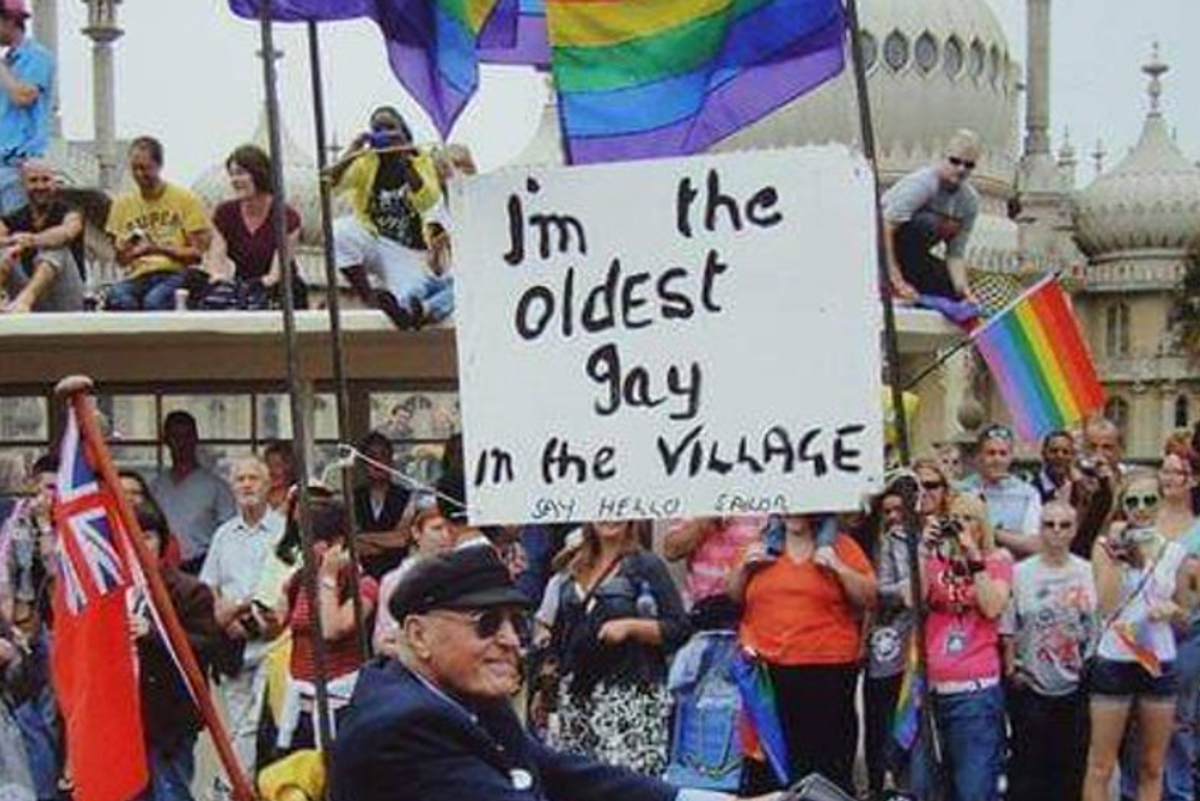People celebrate the life of George Montague aka 'the oldest gay in the village' after his passing
Even at 98 years old, George Montague never shied away from the spotlight. His rainbow mobility scooter had become a yearly staple of Brighton, England’s Pride Parade. He proudly waved a banner declaring “I’m the oldest gay in the village.”
More than just a festive presence, Montague was also a tireless campaigner for gay rights, after his conviction for "gross indecency with a man" in 1974.
When the U.K. government issued the Alan Turing law, which pardoned any gay or bisexual man previously convicted under outdated antigay laws, Montague challenged for a full apology, arguing that a pardon admits guilt.
Thousands signed his petition, and 43 years after the incident, Montague received his apology.
The formal letter that Montague read aloud for BBC News, stated: “Understand that we offer this full apology. Their treatment was entirely unfair. What happened to these men is a matter of the greatest regret and it should be so to all of us.”
“It really made my day, I was over the moon,” he told the BBC after his victory. He was thrilled to watch a more accepting society emerge and evolve throughout his lifetime, a change he actively worked to inspire.
Montague passed away peacefully in his sleep on March 18, with his beloved husband Somchai Phukkhlai by his side. He had fought for a better world, and he won.
Shortly before he died, a sweet statement on Montague’s Twitter read:
“Dear friends and supporters, George is wishing to say goodbye. He thanks everyone who have been supporting his campaign [and hopes] that he might have helped a little for us to live in a better world. Everyone please continue your good works for good causes. I shall rest now.”
The tweet received an outpouring of love from his community, people who were touched by Montague’s passing. Some he had known, others were merely strangers.
Rest in power, George. You've made the world a lovelier place to be
— Jim Hewitt (@jimbarleycorn) March 19, 2022
Rest in the Gayest Rainbow Heaven....... there will be a massive hole in Brighton Pride Parades....... sending our deepest sympathy and good wishes......LOVE WINS pic.twitter.com/XLWOxNHZn2
— An Evil Wicked Queen 👑 ☠️🍎♍ 🏳️🌈🏳️⚧️🇪🇺 (@WickedQueenNige) March 19, 2022
I was so sad yesterday to hear of his death. There will be a massive hole in the Brighton Prides for years to come. He made an impact that most of us will never know or understand. Rest In Peace, George. God Bless and THANK YOU!
— SES (@i_was_an_enigma) March 20, 2022
I didn't know of George until tonight, but I raise the parting glass to a great man and a life well lived. Suaimhneas síoraí ort, George! pic.twitter.com/GJH8gUZIt4
— Matthew McCallion (@mmccallion95) March 19, 2022
Might? I do hope George understood just how important his campaigns were & the incredible contribution he made to improving the world he has now sadly departed.
— Delenn Moresby 🏳️🌈 ☮️ 🇺🇦 (@DelennMoresby) March 19, 2022
I thank the stars that he lived to see justice done, his record cleared & hope he can now truly be at peace.
A really beautiful goodbye. It seems George lived a life he loved, true to himself and deeply accepted his death & was at peace within himself before dying. All of this is not that common. He has lived and died well ♥️
— Kylie (@sen_68kylie) March 19, 2022
Brighton’s parade might be a little less colorful without Montague’s decked-out scooter and waving banner, but the impact he has made on his community is eternal.
LGBTQ groups still face discrimination, especially younger student-aged members facing Florida’s “Don’t Say Gay” bill and Texas’ anti-trans "child abuse" directive. While it can be disheartening, Montague’s story also reminds us that progress has happened and can continue to happen. It is possible to openly love, when it was a crime not very long ago. We still have major strides to go, but there are victories worth celebrating.
May we all be able to live a life as full of love and courage as George Montague.
- An LGBTQ rights group and trans kids fact check a Trump campaign ... ›
- A comedian tears apart a classic anti-gay argument in a hilariously ... ›
- I wanted to know how Mister Rogers felt about gay people. Here's ... ›
- I wanted to know how Mister Rogers felt about gay people. Here's what I found. - Upworthy ›
- 95-year-old grandma nominated for Latin Grammy - Upworthy ›
- Why the 'MAGA Granny' forcefully rejected Trump's pardon - Upworthy ›

